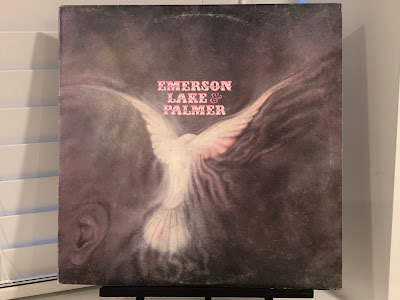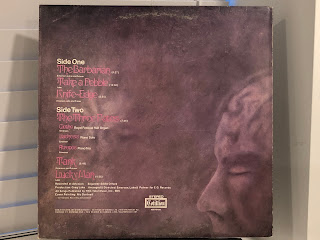The first couple of times through ELP all I could think was "Man, this is different." Not bad, just different. Challenging in a good way, and when I sit and play this I start on one side and go through to the payoff that concludes the record, "Lucky Man."
While I am not an aficionado of all things progressive rock, I have more than a passing appreciation for complex well thought out musical passages. The early '70s was a strange and wonderful incubator for a lot of really odd ball bands who managed to find an audience that was moving past the psychedelic meandering jam bands and was looking for musical meat and potatoes. Yeah I know, back in 1970 (1971 for the rest of us in North America who apparently had to wait and see if we were ready for this stuff) I was all of seven years old, and had no idea what was going on unless it was on AM radio. So for me to sit hear and wax all pseudo intellectual about a scene I grew up through by wasn't part of is pretty presumptuous.
To be honest this album was about as far away from stuff I was listening to as you can get. Still, being able to move backward through time is a lot of fun. So here I am after about a half dozen plays and I'm really getting into this one. From the opening cut "Barbarian" that was apparently a very heavy arrangement of a classical piece by Bela Bartok from 1911 titled "Allegro Barbaro" (Thank you internet for coughing up that little nugget of information). The twelve minute "Take a Pebble" is a really interesting piece of music, and features a great little acoustic guitar section that then gives way to what feels like an extended improvisational jam but was more likely a painstakingly arranged, before resolving to the ending section where Greg Lake sings the song's final verse. The first side closes strong with "Knife-Edge" that is more straight ahead rock with a lot of wicked keyboard work by Keith Emerson, and at the mid point of the song he's let off leash and goes to town before the song winds down ... literally as the tape grinds to a halt.
Flipping it over the second side is again a showcase for the talents of Keith Emerson as the "The Three Fates" is comprised of three solo sections. The first features a festival hall organ (I can read credits, otherwise I'd have just said it was a churchy sounding thing) and then segues into a solo piano piece and then concludes with a piano trio, that was as much a call and response with drummer Carl Palmer that ends with a suitable explosion. It's all pretty interesting and at times a little atonal for me, but not displeasing. I just kept thinking, man the '70s really did have it all. Emerson and Palmer seemed to have so much fun on "Atropos" the final section of "The Three Fates" they just kept going for most of "Tank" until the album's closer "Lucky Man" brought all of the bits and pieces together for a little masterclass in pop magic. This was Greg Lake's showcase, but without the contributions of Emerson, particularly the ending moog sequence and Mr. Palmer's delicate but driving percussion this would have just been an ordinary rock song.Admittedly "Lucky Man" was why I picked this up, but in the end I got so much more than I had expected. Who's the lucky man here?
Me.


Comments
Post a Comment